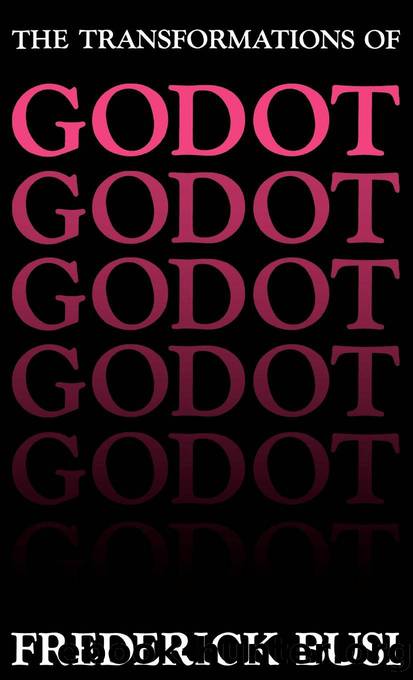The Transformations of Godot by Frederick Busi

Author:Frederick Busi
Language: eng
Format: epub
ISBN: 9780813183992
Publisher: University Press of Kentucky
Published: 2021-06-15T00:00:00+00:00
5. Conclusion
Un jour il se verra . . .
SAMUEL BECKETT
Pour finir encore
The main function of character names in Beckettâs play is to suggest the multiple dimensions of dramatic roles. At the heart of Waiting for Godot is the double desire to recognize and to ignore the awaited one, to see and not to see, to affirm the will to exist and to die. The ability to exist as more than one person at a time is the chief reason for the exchange of character roles and their shifting names. Beckett has charged his clowns to remain in perpetual conflict in order to emphasize the basic strain of agnosticism which frustrates them and their beholders in the audience. Because of these equally balanced contradictory impulses the play, then, seems to end at an impasse.
If these names are deliberately misleading, so too is much of the dialogue. The delayed gratification and the postponed arrival were announced from the outset by Vladimirâs misquotation: âHope deferred maketh the something sick, who said that?â (p. 8). He has in mind the words from Proverbs 13:12, âHope deferred maketh the heart sick: but when the desire cometh, it is a tree of life.â The desire finally materialized when the puny tree on stage sends out a few leaves. Yet the stalemate persists, nothing is consummated, and so the second act appears to be a repetition of the first. However, a very subtle transformation has occurred, one which mainly affects Didi and his way of viewing his position. In this delicate shift of emphasis and perception the central mystery of Godotâs nature and function is crystallized.
Godot is not only an abstract image of hope that allows the tramps to pass the time. He does fulfill that role but his true purpose and identity are more awesome and immediate, and, as we have seen, this has been perceived throughout, though rather inconclusively, by Gogo. Each time Pozzo makes his entrances and exits Gogo believes him to be Godot. Even on the third and final assertion of this intuition toward the end of act 2 Didi still reprimands his companion, but now with a telling difference:
Vladimir: It seemed to me he saw us.
Estragon: You dreamt it. (Pause.) Letâs go. We canât. Ah! (Pause.) Are you sure it wasnât him?
Vladimir: Who?
Estragon: Godot.
Vladimir: But who?
Estragon: Pozzo.
Vladimir: Not at all! (Less sure.) Not at all! (Still less sure.) Not at all!
Estragon: I suppose I might as well get up. (He gets up painfully.) Ow! Didi!
Vladimir: I donât know what to think any more. (p. 58)
Download
This site does not store any files on its server. We only index and link to content provided by other sites. Please contact the content providers to delete copyright contents if any and email us, we'll remove relevant links or contents immediately.
The Power of Myth by Joseph Campbell & Bill Moyers(1068)
A Social History of the Media by Peter Burke & Peter Burke(988)
Half Moon Bay by Jonathan Kellerman & Jesse Kellerman(987)
Inseparable by Emma Donoghue(983)
The Nets of Modernism: Henry James, Virginia Woolf, James Joyce, and Sigmund Freud by Maud Ellmann(914)
The Spike by Mark Humphries;(812)
The Complete Correspondence 1928-1940 by Theodor W. Adorno & Walter Benjamin(789)
A Theory of Narrative Drawing by Simon Grennan(783)
Culture by Terry Eagleton(776)
Ideology by Eagleton Terry;(743)
World Philology by(719)
Farnsworth's Classical English Rhetoric by Ward Farnsworth(715)
Game of Thrones and Philosophy by William Irwin(712)
Bodies from the Library 3 by Tony Medawar(709)
High Albania by M. Edith Durham(705)
Adam Smith by Jonathan Conlin(695)
A Reader’s Companion to J. D. Salinger’s The Catcher in the Rye by Peter Beidler(689)
Monkey King by Wu Cheng'en(654)
Comic Genius: Portraits of Funny People by(653)
